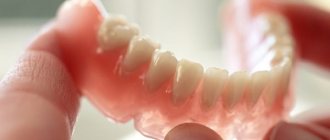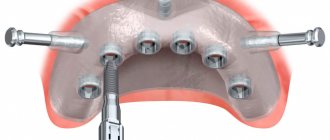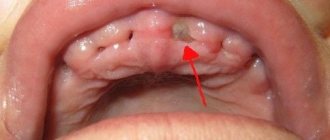Implantation during “critical days”: why doctors are against
When asked whether it is possible to place an implant during menstruation, any highly professional specialist will answer that this cannot be done. Moreover, the doctor is simply obliged, even at the stage of collecting anamnesis, preparing and working out a treatment plan, to ask the patient all the delicate questions: the date of the next menstruation, whether the woman is planning a pregnancy or IVF, whether she is pregnant or is breastfeeding for a given period of time. Obtaining detailed and truthful information on this matter is equally important both for the specialist and for the health and well-being of the patient herself.
Do not forget that dental implantation is a procedure that involves violating the integrity of living tissues of the body. Even though modern technologies allow it to be carried out taking into account the slightest individual characteristics of the patient, with preliminary preparation and 3D modeling of the treatment process, to eliminate risks and to do it minimally invasively. But, like any intervention, implantation has a number of absolute and relative contraindications. In absolute cases, treatment cannot be carried out in principle: tuberculosis, poor blood clotting, renal and liver failure, the presence of malignant tumors, autoimmune diseases.
For relative cases, which also include menstruation, the procedure is simply postponed until the contraindications are eliminated. This also includes a lack of jaw bone tissue, pregnancy and breastfeeding, planning pregnancy and IVF, the presence of cysts and granulomas, insufficient sanitation of the oral cavity, weakened immunity and the presence of diseases in the acute stage.
Why do you need to prepare for dental implantation before surgery?
Preoperative preparation will make it possible to understand whether implantation is indicated for a particular patient, whether there are contraindications or not, to become familiar with the individual characteristics of bone tissue in order to correctly plan the places and angle of implantation of a titanium rod, etc.
As for the preparatory measures prescribed by the dentist, these are:
- Examination by a dentist-therapist with the provision of blood and urine test results. The data will help the doctor confirm or refute restrictions/contraindications and/or provide direction for procedures that will restore health to the required level.
- CBCT and possibly other hardware diagnostics. It will allow you to assess the condition of the dental system and tissues and identify individual characteristics. To install artificial roots, it is very important to know the location of the maxillary sinuses and mandibular joint - this data is provided by CT results.
- Examination by doctors of different specialties. This is required if the patient is diagnosed with serious chronic diseases, such as various types of cardiovascular pathologies, diabetes mellitus, etc. Before dental implantation, you need to know that specialized doctors allow the operation of implantation, and there are no contraindications to this.
- Sanitation and hygiene of the oral cavity based on the recommendations of the dentist-therapist and according to indications, based on the requirements for each individual patient.
The last step in preparation is a final consultation with the dentist, who will explain the rules of preparation, talk about post-operative care and set a positive mood before surgery. Each of the stages is very important, so it is recommended to follow all the instructions and advice of doctors.
When you can and when you can’t start installing implants
Dental implantation is not performed during menstruation. Doctors also recommend postponing it if you plan to have your period in the next 3-5 days. It is during this period of time that active hormonal changes in the body occur, metabolism decreases, and the number of red blood cells and hemoglobin in the blood jumps sharply (immediately after the start of menstruation, these indicators, on the contrary, sharply decline). Also, under the influence of hormones, a large number of toxins accumulate in the body, the outflow of fluid becomes difficult, blood sugar levels decrease, and hormonal imbalance occurs. Against this background, the woman manifests a stressful, depressed state, and mood swings.
At the end of menstruation, it is advisable to wait 3-5 days for the female body to recover. And already then you can safely begin to restore dental defects.
In 60% of all women, the menstrual cycle is 28 days, the duration of “critical days” ranges from 2 to 7. The body loses up to 40 milliliters of blood per day, up to 150 milliliters over the entire period, which significantly weakens its protective functions and reactions.
Learn more about taking medications before dental implants
Since prosthetics are most often needed by older people who have chronic diseases, the relevant question is: what do you need to know about taking medications when preparing for dental implantation before surgery? There are specific recommendations on this matter:
- Tell your implantologist if you are taking blood pressure medications. If your blood pressure is not normal due to anxiety, you may need medication prescribed to you before implantation. The doctor must know all the nuances and be prepared for any development of events. Therefore, come to the clinic 30-40 minutes before the operation so that, if necessary, take the drug and wait for it to take effect.
- If the sugar level deviates from the norm, patients are prescribed anticoagulants, which are strictly prohibited before any surgical procedures. Aspirin and other blood thinners may cause bleeding after implantation. Discuss this issue with your endocrinologist to find a solution and understand how to stop taking anticoagulants, at least for the day of surgery.
- When preparing for dental implantation, you need to stop all intensive care activities. If you are taking a lot of medications and cannot yet stop taking them, inform the implantologist about this and he will reschedule the operation for a more convenient period.
It is impossible to list all the nuances in one universal recommendation. Therefore, be sure to inform your dentist about the list of medications you are taking. He, based on individual indications, will decide whether surgery is indicated without giving up specific medications or not.
What happens to a woman's body during menstruation
During this difficult period for a woman, her body experiences stress, her immunity decreases, and the following changes occur that can significantly affect her well-being during dental implantation:
- the pain threshold increases: this means that even minor injuries can seem very painful. And analgesics and even strong anesthesia may simply be ineffective during this period. For example, it is also not recommended to remove teeth during menstruation (although with one-step implantation methods, two procedures can be carried out simultaneously), because in this state a woman can simply lose consciousness from pain shock. Even though the procedure is not actually that painful, and when anesthesia is used, it generally takes place without any discomfort,
- it is difficult to relieve pain after surgery: even if the procedure was successful, after the intervention you cannot avoid the body’s natural reaction and pain, and pills may not cope,
- blood clotting is impaired: during this period, the number of platelets in a woman’s blood sharply decreases (by 40-60% compared to the norm), which are precisely responsible for good blood clotting after any surgical interventions. This mechanism is programmed by nature and allows you to avoid the occurrence of blood clots, blockage of blood vessels, and the formation of clots in internal organs during “critical days”,
- immunity sharply decreases and at the same time the risk of contracting an infection increases. He will accompany you both during the installation of implants, if sterility was violated, and during the rehabilitation period. Indeed, in such conditions, the entry of even a small number of pathogenic bacteria into the wound can result in severe infectious inflammation, suppuration, peri-implantitis,
- Blood pressure drops: against this background, headaches and malaise occur.
Number of allocations
Due to the fact that during the attachment of a fertilized egg the capillaries are damaged, the discharge has a spotting character. Sometimes this may be the only stain on the laundry. The scarcity of implantation regulations distinguishes them from possible menstruation. Sometimes women do not even pay attention to such changes, but they are the ones who can report pregnancy earlier than the hCG test.
What complications may arise during and after implantation?
The menstrual cycle, namely the moment of menstruation itself, and the installation of implants should not be combined. This can lead to unpleasant consequences.
Does the chosen implantation method affect contraindications? The least number of contraindications exist for one-stage implantation options with immediate loading, when the installation of implants and fixation of the prosthesis takes place in the shortest possible time. The greatest is a two-stage treatment with delayed loading, when the treatment process is extended over months. But in both cases, it is not recommended to install the implant during the “critical days”. Also, other related operations that require surgical intervention cannot be performed: sinus lifting or bone tissue augmentation, gum grafting.
The following are complications that may occur if surgery is performed against the background of hormonal changes. Of course, they are rare. Plus, a competent specialist will conduct training, that is, he will definitely assess the patient’s health condition.
Development of bleeding
During her critical days, a woman already loses blood. And when a doctor performs the procedure for installing implants, even if he does it in the most minimally invasive way, by puncture and through special surgical templates, the specialist still affects the mucous membrane, gums, and affects capillaries and blood vessels. But the danger is not even this, but the fact that platelet production is disrupted during menstruation. Simply put, when the capillaries are damaged, the blood becomes less able to clot, which can develop into serious, severe and unstoppable bleeding.
With complications, a woman can lose more than 500 milliliters of blood, and this condition requires urgent hospitalization.
Blood clots
As mentioned above, malfunctions in the hematopoietic system and blood clotting can lead to significant blood loss. But given the individual characteristics of the body, the exact opposite situation can also happen: cuts on the mucous membrane, disruption of the integrity of soft and hard tissues can contribute to increased activation of blood clotting factors. In this case, the resulting clots, or blood clots in other words, can “get stuck” directly in the vessels, preventing the flow of oxygen and nutrients to the organs. Then complications can occur in the heart, brain, lungs and other vital organs.
Formation of intraosseous hematoma
It is continuous bleeding that can become a risk factor for the development of this complication. The release of blood in the area where the implant comes into contact with the jaw bone is especially dangerous. Because It is here that, in an unfavorable environment, fibrous tissue begins to actively form, which prevents the implant from firmly merging with the bone. What consequences will this lead to? The implant will begin to wobble and shift. Moreover, at a doctor's appointment, palpation will reveal that it is rotating inside, and it will only be possible to remove it with surgical intervention.
Implant rejection
Hormonal imbalance during menstruation also affects a woman’s mental state. During this period of time, she is susceptible to stress and nervous overexcitability. The body’s protective functions are also suppressed; accordingly, the most critical period after the installation of implants – the first days – will be complicated by more intense pain, and the tissue will take longer to heal than in a normal situation. The risk of infection also increases. Against the background of reduced immunity, this may result in implant rejection.
Of course, such complications do not occur in all women and they can occur in a mild form. But still, it’s better not to take risks, even if you spend the period of “critical days” easily and without much discomfort. Wait a couple of weeks and, together with your doctor, choose a date for surgery that will be as safe as possible for you.
Author: Dzhutova A. V. (Thank you for your help in writing the article and the information provided)
Timing of implantation
After ovulation and the meeting of the egg with the sperm, the fertilized zygote begins to move through the fallopian tubes. Its task is to get into the uterus as quickly as possible in order to gain a foothold in the endometrium specially prepared for this. Along the way, the zygote continuously divides and grows. occurs at the blastocyte
Conventionally, we can distinguish between middle, late and early implantation.
- Early. It is quite rare. Usually, implantation that occurs 6-7 days after ovulation is considered early (or 3 dpp - 4 dpp if we are talking about IVF)
- Average. 7-10 days pass between fertilization and implantation ( implantation of the embryo after transfer occurs approximately 4-5 days). Doctors say that it takes about 40 hours for morula to penetrate, after which the body begins to produce the hormone hCG in the blood, and the basal temperature . Based on this, the so-called embryonic period of development, which lasts until approximately 8 weeks of pregnancy.
- Late. Occurs approximately 10 days after fertilization. This is what always gives women at least a faint hope of a possible pregnancy - even when you can hardly expect it anymore.
If pregnancy does not occur for a long time, then you need to be examined to identify the cause of infertility.
Can menstruation guarantee that pregnancy has not occurred?
First, let's remember what the menstrual cycle is.
This is the alternation of menstruation itself (lasts 3-7 days), the follicular phase, ovulation and the luteal phase. During menstruation, the lining of the uterus is shed. The process is accompanied by bleeding (this happens at the end of the ovulatory cycle). If there was no ovulation, then the bleeding is called menstrual-like. It is extremely rare for two eggs to mature in one cycle (but it happens!): one is fertilized, and the second is rejected by the body and causes the onset of menstruation.
Normally, there can be no menstruation during pregnancy.
However, do we always understand the nature of vaginal bleeding without medical diagnosis? If during the expected menstruation a woman notices bloody discharge, but its character is different from the usual menstruation (the discharge is scanty, ends quickly, has a brown or bright scarlet color) and you remember that unprotected sexual intercourse took place - this is a reason to do take a pregnancy test and consult a doctor.











